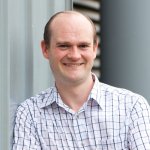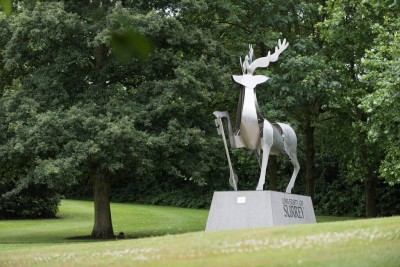Electronic Engineering (by short course) MSc – 2026 entry
This course has been introduced to comprise elements drawn from our full-time MSc programmes. Its purpose is to encourage industrial professionals to continue with their development without necessitating an expensive career break and minimising disruption to work.
Key course information
Why choose this course
The modular approach this course offers means that you can choose your own pace of study to fit in with your existing work commitments.
We sit within the Faculty of Engineering and Physical Sciences, which promotes excellence in research and education across a wide range of topics. Our School has a worldwide reputation in several research areas, including:
- Machine vision, speech and signal processing
- Mobile and satellite communication systems
- Nanotechnology, renewable energy and advanced electronics
- Radio frequency engineering
- Space engineering.
Notably, the School is home to the 5G/6G Innovation Centre and Surrey Ion Beam Centre, and founded the Surrey Satellite Technology Ltd.
What you will study
Students will attend eight one-week courses in areas such as communications, systems design, IP networking, Internet of Things and 5G.
In addition to these, you’ll complete a dissertation project. It’s possible for you to undertake your project in the context of your day job, which not only helps to manage time between work and study, but can facilitate direct transfer of knowledge from what you’ve learned into the work you carry out.
Professional recognition
MSc - Institution of Engineering and Technology (IET).
Accredited by the Institution of Engineering and Technology (IET) on behalf of the Engineering Council for the purposes of fully meeting the academic requirement for registration as an Incorporated Engineer and partially meeting the academic requirement for registration as a Chartered Engineer.
International students travelling to the UK
Due to the module structure of this programme, we are unable to provide sponsorship on the Student Route. International students should make use of the Visitor Visa Route to attend the practical component of the programme. Further details can be found on our apply for a visa page.
Unfortunately, the University cannot guarantee that Visitor Visa applications will be successful, and a refusal may result in students being unable to successfully complete the programme.
Modules
Modules listed are indicative, reflecting the information available at the time of publication. Modules are subject to teaching availability, student demand and/or class size caps. Some modules are delivered online where a short course is not available or cannot be run.
The University operates a credit framework for all taught programmes based on a 15-credit tariff, meaning all modules are comprised of multiples of 15 credits, up to a maximum of 120 credits.
Eight modules are required to be taken, which must include the compulsory module, Research, Professionalism and Innovation. Note that a maximum of two modules at Level 6 may be chosen.
The modules and their level are listed with links to the full module descriptions. Where modules are delivered via a short course it normally has a different name as shown in the short course column. Each course has a corresponding exam period within which the exam occurs as shown in the table. For a list of forthcoming short courses please visit the short course calendar.
*This module is compulsory and must be taken at any point after at least one other module has been completed. There is no course attendance for this module, it is delivered online.
**This course is supplemented with a three month distance learning programme comprising extra course material, tutorials, working through past exam papers and liaison with a tutor.
Programme leader

Dr Tim Brown
Senior Lecturer in RF Antennas and Propagation
Entry requirements
A minimum of a 2:2 UK honours degree in electrical engineering, electronic engineering, computer engineering, electronic and computer engineering, mathematics, physics or telecommunication engineering, or a recognised equivalent international qualification.
Explore international entry requirements by country.
Exceptionally, other qualifications, combined with evidence of relevant employment, can be taken into account in lieu of a UK honours degree or relevant first degree.
English language requirements
IELTS Academic: 6.5 overall with 6.0 in writing and 5.5 in each other element.
These are the English language qualifications and levels that we can accept.
If you do not currently meet the level required for your programme, we offer intensive pre-sessional English language courses, designed to take you to the level of English ability and skill required for your studies here.
Selection process
The University has to be satisfied that the candidate is suitable for an MSc, particularly with regards to the level of mathematics required, and a candidate may be called for an informal interview.
Fees and funding
| Rate type | Fees |
|---|---|
| IET members | £2,000* |
| Non-IET members | £2,100 |
| Standard rate | £2,300 (for all bookings made within one month of the course start date) |
*Please send us your IET membership number.
- The dissertation module is charged as a 60-credit module for fee purposes
- Registration is currently free of administrative charges. A charge will be made for attending the short course corresponding to a module
- These fees apply to students commencing study in the academic year 2026-27 only. Fees for new starters are reviewed annually.
For current fees please contact the FEPS Short Courses team at fepsshortcourses@surrey.ac.uk.
Payment schedule
It is possible for a company to pre-pay for modules within the academic year. Please note that a degree cannot be awarded unless all outstanding monies have been paid, including the cost of the project.
Additional costs
There may be additional costs for writing paper and associated stationery.
Apply
Please email the FEPS Short Courses team at fepsshortcourses@surrey.ac.uk to get the application form for this course. This form is processed by the Admissions Team and, if satisfactory, a formal offer will be made.
Supporting evidence for an application includes:
- Evidence of degrees or HNCs/HNDs claimed
- Two referees
- A letter of support from the applicant’s company
- Evidence of previous experience.
The University reserves the right to refuse an application if it is felt that the student will have problems attaining the academic standards required for the MSc.
Depending on when you sign up, the date of registration will be backdated to the start of the nearest quarter, i.e. January, April, July or October.
Admissions information
Once you apply, you can expect to hear back from us within 14 days. This might be with a decision on your application or with a request for further information.
Our code of practice for postgraduate admissions policy explains how the Admissions team considers applications and admits students. Read our postgraduate applicant guidance for more information on applying.
Terms and conditions
When you accept an offer to study at the University of Surrey, you are agreeing to follow our policies and procedures, student regulations, and terms and conditions.
We provide these terms and conditions at offer stage and are shown again at registration. You will be asked to accept these terms and conditions when you accept the offer made to you.
View our generic registration terms and conditions (PDF) for the 2025/26 academic year, as a guide on what to expect.
Disclaimer
This online prospectus has been published in advance of the academic year to which it applies.
Whilst we have done everything possible to ensure this information is accurate, some changes may happen between publishing and the start of the course.
It is important to check this website for any updates before you apply for a course with us. Read our full disclaimer.
Contact details
For further information, please contact:
The FEPS Short Courses team: fepsshortcourses@surrey.ac.uk.
Course location

Stag Hill is the University's main campus and where the majority of our courses are taught.